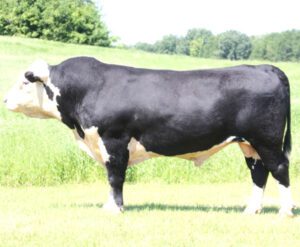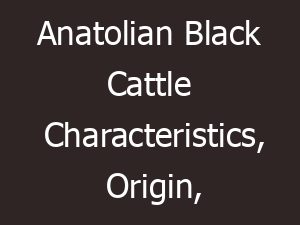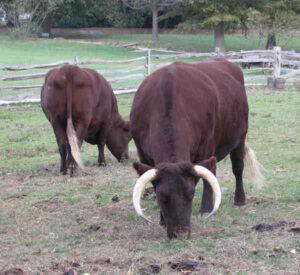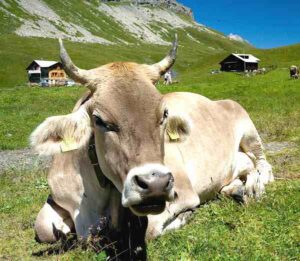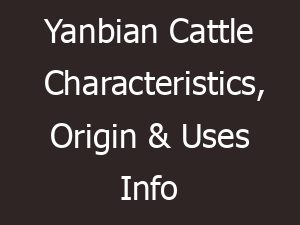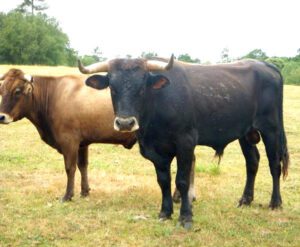The Jersey cattle are relatively a small breed of dairy cattle which are raised primarily for milk production. It is originally bred in the Channel Island of Jersey.
The breed is popular and famous for high milk production and also for the high butterfat of their milk. The breed was apparently descended from the cattle stock brought over from the nearby Norman mainland, and it was first recorded as a separate breed around 1700.
It was isolated from outside influence for over two hundred years (actually from 1789 to 2008). Currently the breed is raised mainly for milk production and raised as a dairy cattle breed throughout the world.
Today, Jersey is among the most popular dairy cattle breed in the world. They are popular mainly because of their feed to milk conversion ratio and also for the quality of milk. Read more information about this popular dairy cattle breed below.
Origin And History Of Jersey Cattle
Jersey is a popular cattle breed in many countries around the world. It is a dairy cattle breed which was originally bred in the Channel Island of Jersey. These cows are known for their small size, gentle nature, and the beautiful light brown color of their coats.
The history of Jersey cattle goes back a long time (to around 1763 when they were first recorded on the island). People started breeding them carefully to keep their good qualities, such as their milk production and friendly temperament. Today, the breed is not only popular in it’s native area, but also in other parts of the world (like the United States and Canada).
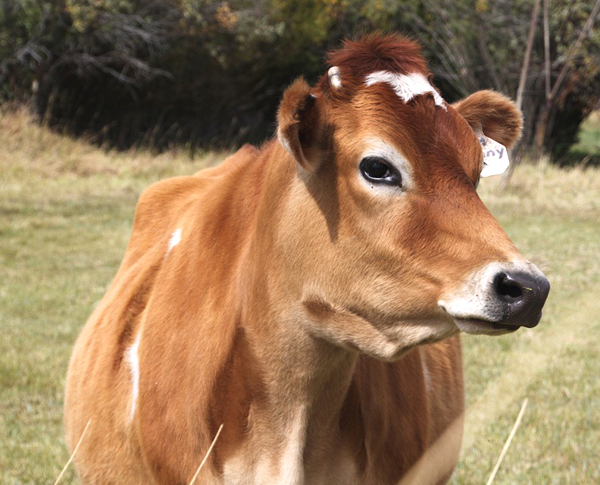
Characteristics
The Jersey cattle are relatively a smaller sized dairy cattle breed. Their body color is usually slightly red, deep brown or mixed. They have relatively long sized head, and they usually have no hunchback. Tail of the Jersey cattle is of black color and as a dairy breed their udder is usually big. Both bulls and cows usually have horns. Their horns are usually thin and curved.
Size and weight
The jersey cows typically stand about 42 to 48 inches tall at the shoulder. The bulls are pretty larger than the cows, and they stand about 50 to 55 inches tall at the shoulder. Average live body weight of the mature Jersey cows vary from 400 to 500 kg. And the mature bulls on average weight between 540 and 820 kg.
Housing Requirements
A good, secure and comfortable housing system for your animals is very important for raising the Jersey cattle. A good cattle housing system will help to keep your animals healthy and secure from adverse weather conditions and harmful predators. Ensure good ventilation system and also ensure flow of sufficient amount of air and light inside the house.
Dietary Requirements
Feeding the animals with very good quality and nutritious food is the most important part of successful dairy cow farming business. So, try to feed your cattle with very good quality and nutritious food. As the Jersey is a dairy cattle, so it requires more greens in it’s diet for better milk production. Also provide them with adequate clean and fresh drinking water as per their demand.
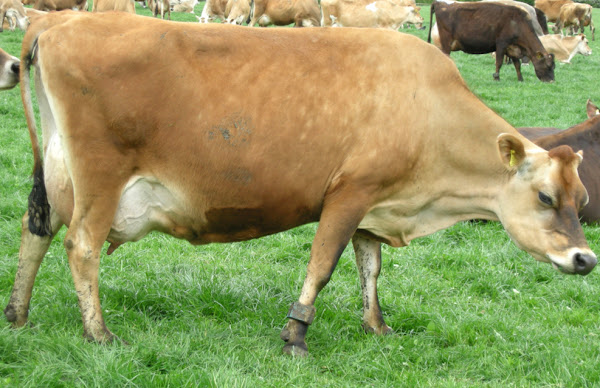
Breeding/Reproduction
Like many other domestic cattle breeds, the Jersey cattle are naturally very good breeders. They will breed easily without human intervention if you keep just one bull in your herd.
Health Management
Jersey cattle are generally healthy and active animals. Taking good care of their health is very important to keep them healthy, happy and productive. Always ensure they have clean water and good food to eat every day. Their diet should include plenty of grass, hay, and sometimes special feed to keep them healthy.
Perform regular health check-ups with a veterinarian. Timely vaccinations can help to prevent diseases and other health problems, and routine grooming keeps their coats clean and free from pests. Always try to provide them with a comfortable and clean living environment.
Hardiness
Jersey cattle are known for their hardiness and adaptability to many different climatic conditions. And this trait has made them a popular dairy cattle breed. Actually, their ability to thrive in different places makes them popular on farms worldwide. Their comparatively smaller size also contributes to their hardiness. They are resilient animals, and they are able to withstand challenges like changes in weather or fluctuations in food availability (and this hardiness makes them valued assets for farmers).
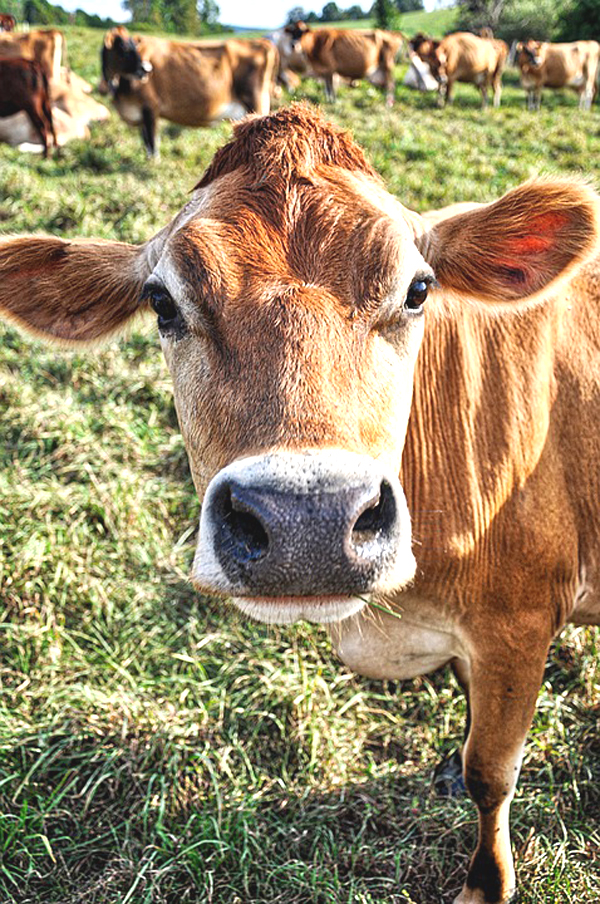
Behavior/Temperament
Jersey cattle are known for their friendly behavior and gentle nature. They are generally calm and very easy to handle. Thats why they are very popular among farmers and families in many countries throughout the world. These cattle are also known for their intelligence and they can learn routines quickly.
Caring
Along with good and nutritious feeding, taking good care of the animals is also very important. So, try to take good care of them and also try to monitor their health on a regular basis. And keep good contact with a vet, so that you can call him/her during emergencies.
Lifespan
Average lifespan of these cattle is around 10 to 12 years. But some animals can also live longer with proper care.
Uses
The Jersey cattle are mainly a dairy cattle breed. They are raised primarily for milk production.
Price
Jersey is a popular cattle breed in many countries around the world. The breed is popular mainly due to it’s gentle nature, adaptability to various climatic conditions, and also for high-quality milk production. Exact price of these cattle can vary from place to place. Please visit some of your nearest breeders or farmers to know more about it’s current price.

Pros And Cons Of Jersey Cattle
Like many other cattle breeds, the Jersey cattle also has some advantages and disadvantages. Here we are trying to list the notable pros and cons of Jersey cattle.
Pros:
- High milk production
- Gentle temperament
- Adaptability to various climates and environmental conditions
- Efficient feed to milk conversion ratio
- Small size
- High fertility
Cons:
- Heat sensitivity
- Higher fat content
- Susceptibility to mastitis
- Potential for obesity
- Initial cost is high

Special Notes
The Jersey cattle are very docile in temperament. They are noted for lower maintenance and also for superior grazing ability. The breed is also noted for easy calving. The calf is relatively small in size when they born.
They grow relatively faster and contain low fat in their body. The Jersey cows are excellent milk producers. And on an average the cows can produce 3500-4500 kg of milk per year. Their milk is of very good quality containing about 5 percent of butterfat content. However, review full breed profile of the Jersey cattle in the following chart.
| Breed Name | Jersey | |
| Other Name | Jersey | |
| Breed Purpose | Milk | |
| Special Notes | Well adapted to almost all climates, good for milk production, able to withstand extreme variations in temperature, fertile, ease of calving, long life, good quality milk, docile temperament | |
| Breed Size | Small to medium | |
| Bull’s Weight | 540-820 kg | |
| Cow’s | 400-500 kg | |
| Climate Tolerance | All climates | |
| Coat Color | Slightly red, deep brown or mixed | |
| Horned | Yes | |
| Milk Yield | Very good | |
| Rarity | Common | |
| Country/Place of Origin | Jersey |
Frequently asked questions (FAQs)
People often ask several questions regarding this cattle breeds. Here we are trying to list the most common and frequently asked questions about Jersey cattle and trying to answer them. Don’t hesitate to ask if you have more questions.
Are jersey cattle femenine?
No, they are not inherently “feminine”. These animals are small and elegant and are known for their gentle temperament and high butterfat milk. Both male and female Jerseys can be strong and hardy.
Are jersey cattle good beef?
No, they are not good for beef. Jersey is mainly raised for milk production purpose.
Are jersey cattle polled or horned?
Depending on their genetics, the jersey cattle can be either horned or polled.
How did jersey cattle get to America?
Jersey cattle were fist introduced to America in the mid-1800s. They were brought over from the Channel Island of Jersey by private breeders. And in America, they quickly became popular mainly due to their high milk production. Today, the breed is one of the most widely recognized dairy cattle breeds in the United States of America.
How does the climate affect housing for jersey cattle?
Climate plays a key role in determining the housing needs for these Jersey cattle. They are sensitive to both extreme heat and cold. They require insulated barns in cold weather with proper bedding to keep warm. While in hot climates, good ventilation, shade, and cooling systems are essential to prevent heat stress. A good housing facility helps the cattle to adapt to varying climates and maintain their well-being year-round.
How to identify jersey cattle?
Jersey cattle can easily be identified by their distinctive physical characteristics. They are small, dairy cattle breed with a distinctive light to dark tan coat (often featuring white markings). They have a refined, compact build body, with a narrow face, large dark eyes, and large, forward-facing ears. Most of these cattle are polled, and only some may have small, curved horns.

